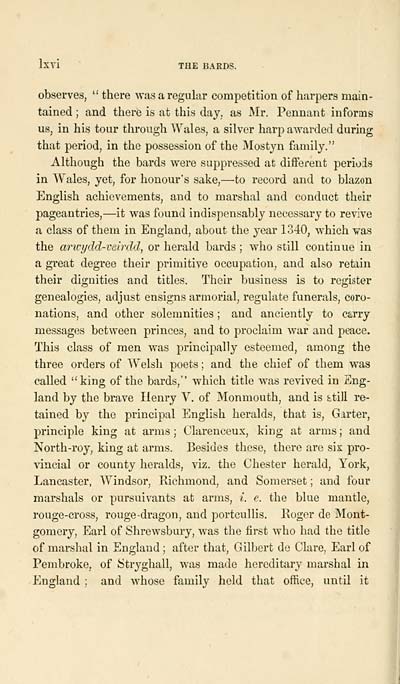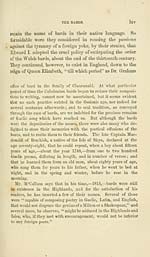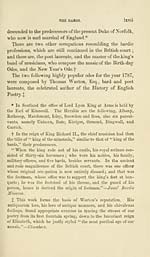Download files
Complete book:
Individual page:
Thumbnail gallery: Grid view | List view

Ixvi THE BARDS.
observes, " there was a regular competition of harpers main-
tained ; and there is at this day. as Mr. Pennant informs
us, in his tour through Wales, a silver harp awarded during
that period, in the possession of the Mostyn family."
Although the bards were suppressed at different periods
in Wales, yet, for honour's sake, — to record and to blazon
English achievements, and to marshal and conduct their
pageantries, — it was found indispensably necessary to revive
a class of them in England, about the year 1340, which vas
the aricydd-veirdd, or herald bards ; who still continue in
a great degree their primitive occupation, and also retain
their dignities and titles. Their business is to register
genealogies, adjust ensigns armorial, regulate funerals, coro-
nations, and other solemnities ; and anciently to carry
messages between princes, and to proclaim war and peace.
This class of men was principally esteemed, among the
three orders of Welsh poets ; and the chief of them was
called "king of the bards," which title was revived in Eng-
land by the brave Henry Y. of Monmouth, and is ttiJl re-
tained by the principal English heralds, that is. Garter,
principle king at arms ; Clarenceux, king at arms ; and
North-roy, king at arms. Besides these, there are six; pro-
vincial or county heralds, viz. the Chester herald, York,
Lancaster, AVindsor, Richmond, and Somerset ; and four
marshals or pursuivants at arms, i. e. the blue mantle,
rouge-cross, rouge -dragon, and portcullis. Eoger de Mont-
gomery, Earl of Shrewsbury, was the first who had the title
of marshal in England ; after that, Gilbert do Clare, Earl of
Pembroke, of Stryghall, was made hereditary marshal in
England ; and whose family held that office, until it
observes, " there was a regular competition of harpers main-
tained ; and there is at this day. as Mr. Pennant informs
us, in his tour through Wales, a silver harp awarded during
that period, in the possession of the Mostyn family."
Although the bards were suppressed at different periods
in Wales, yet, for honour's sake, — to record and to blazon
English achievements, and to marshal and conduct their
pageantries, — it was found indispensably necessary to revive
a class of them in England, about the year 1340, which vas
the aricydd-veirdd, or herald bards ; who still continue in
a great degree their primitive occupation, and also retain
their dignities and titles. Their business is to register
genealogies, adjust ensigns armorial, regulate funerals, coro-
nations, and other solemnities ; and anciently to carry
messages between princes, and to proclaim war and peace.
This class of men was principally esteemed, among the
three orders of Welsh poets ; and the chief of them was
called "king of the bards," which title was revived in Eng-
land by the brave Henry Y. of Monmouth, and is ttiJl re-
tained by the principal English heralds, that is. Garter,
principle king at arms ; Clarenceux, king at arms ; and
North-roy, king at arms. Besides these, there are six; pro-
vincial or county heralds, viz. the Chester herald, York,
Lancaster, AVindsor, Richmond, and Somerset ; and four
marshals or pursuivants at arms, i. e. the blue mantle,
rouge-cross, rouge -dragon, and portcullis. Eoger de Mont-
gomery, Earl of Shrewsbury, was the first who had the title
of marshal in England ; after that, Gilbert do Clare, Earl of
Pembroke, of Stryghall, was made hereditary marshal in
England ; and whose family held that office, until it
Set display mode to: Large image | Transcription
Images and transcriptions on this page, including medium image downloads, may be used under the Creative Commons Attribution 4.0 International Licence unless otherwise stated. ![]()
| Early Gaelic Book Collections > Ossian Collection > Ossian, his principal poems > (70) |
|---|
| Permanent URL | https://digital.nls.uk/82621741 |
|---|
| Description | Selected books from the Ossian Collection of 327 volumes, originally assembled by J. Norman Methven of Perth. Different editions and translations of James MacPherson's epic poem 'Ossian', some with a map of the 'Kingdom of Connor'. Also secondary material relating to Ossianic poetry and the Ossian controversy. |
|---|
| Description | Selected items from five 'Special and Named Printed Collections'. Includes books in Gaelic and other Celtic languages, works about the Gaels, their languages, literature, culture and history. |
|---|

